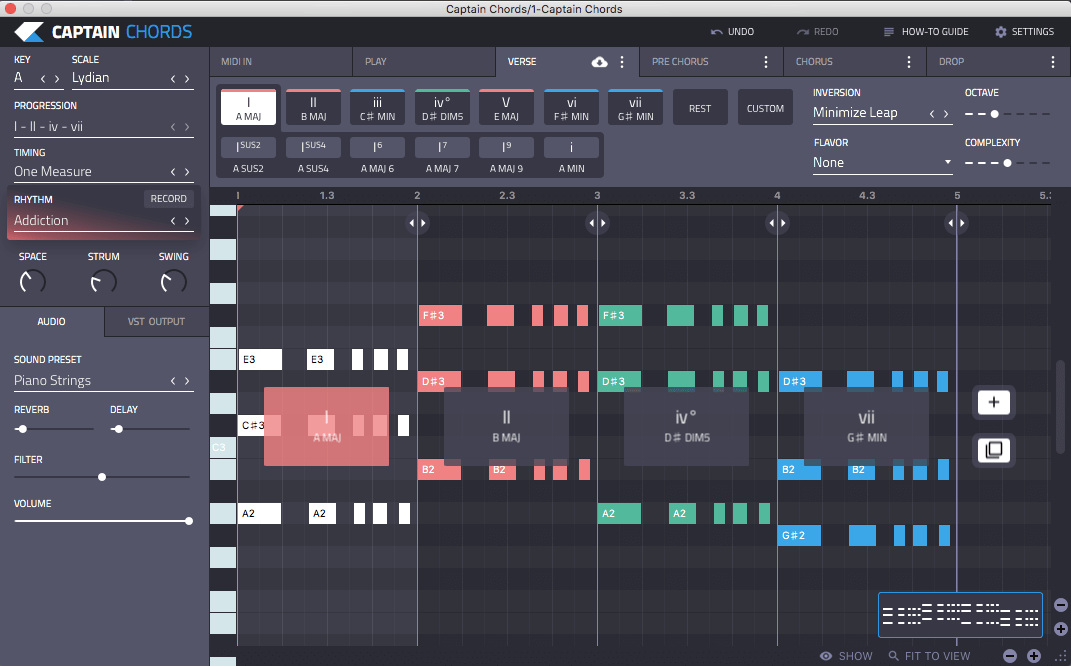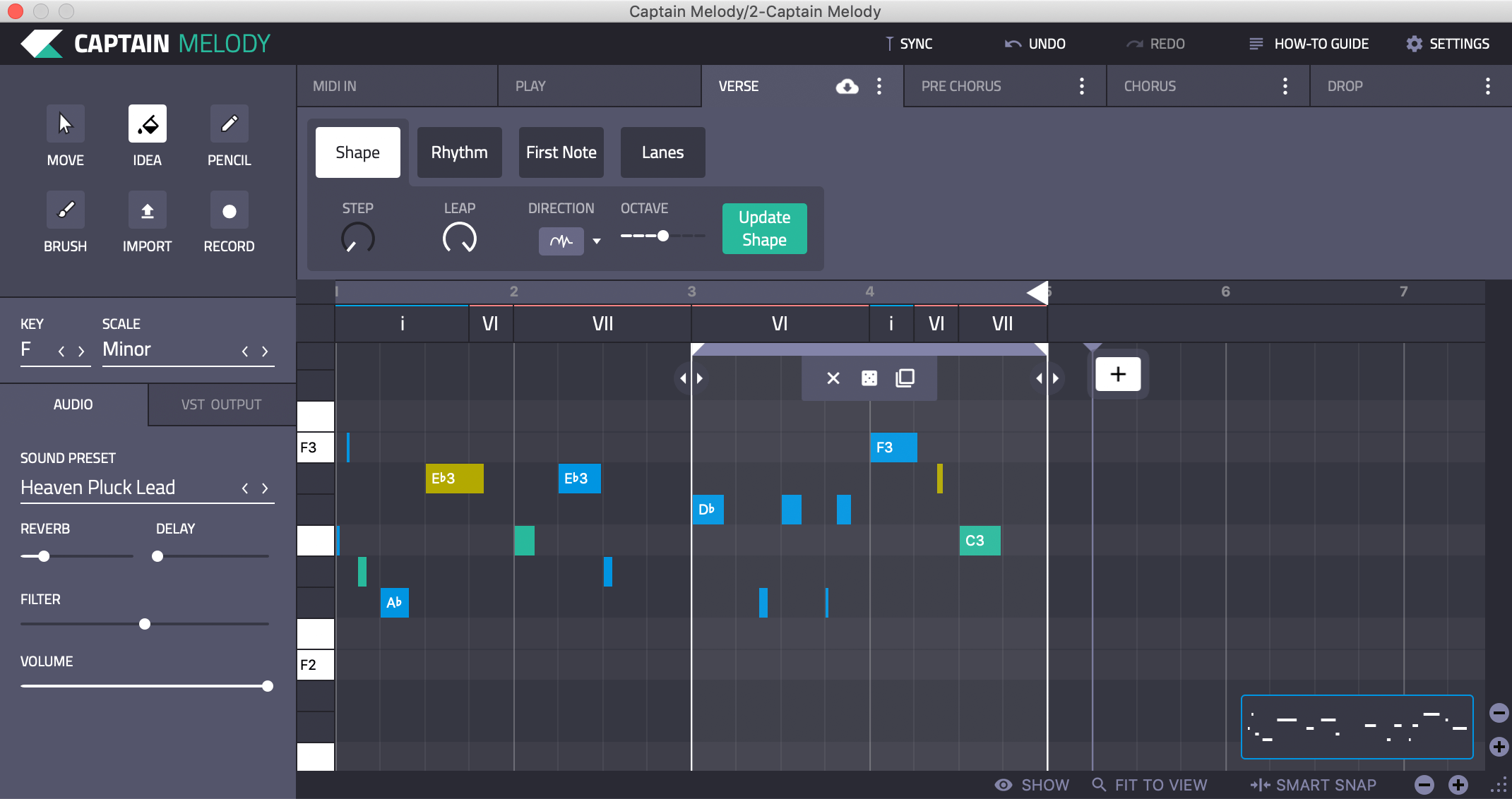How to promote your music.
 Photo by Diggity Marketing on Unsplash
Photo by Diggity Marketing on Unsplash
Getting your music heard by the right people is a perennial challenge for independent artists. However, in many ways it’s never been easier to break through without the assistance of major labels. One thing is without doubt – successful artists all have a well considered and effective promotional strategy.
But do you know how to promote your music? Adam Hignell runs the gamut on some high-return promotion methods:
Write Chords Faster with Captain Chords
- Use Captain Plugins to write your own Chord Progressions, Hooks, Melodies and Basslines
- Export to your DAW
- Available on Mac and Windows.
Quality music above all.
Before we get stuck into promotion, it should be self-evident that the music itself should be of a professional standard. Anything less is doomed to fail in today’s competitive landscape.
Ensure your track is mixed beautifully, mastered professionally and sounds as good as possible. Once you’re happy, it’s time to form a strategy…
There’s no ‘easy’ way.
Even with a huge budget, successful music marketing and promotion takes hours or hard graft to get right. If you’re an A-List star, most of those hours are taken on by your team, but if you’re an independent artist, you better be prepared to do a lot of work. You’ll need to learn new skills, such as social media management, video production, basic graphic design and the hard-to-quantify soft-skill of networking. And you thought it was all about the music.
Today’s artists need multiple skills, tenacity, the willingness to take rejection on the chin, and the desire to keep learning, keep improving. It isn’t easy. But there are some methods and practices that may save time and reduce stress.
 Photo by Lukas Blazek on Unsplash
Photo by Lukas Blazek on Unsplash
Understand your brand.
Some of the most common mistakes in music promotion stem from a fundamental misunderstanding of the product.
It can be hard to separate yourself from the art you make, so you might find consulting friends or family really useful. You want to know how people perceive what you do, and whether that matches the way you want to present yourself. Identify a handful of successful artists who make music in your style, and assess their branding. Do they tend towards moody, dimly-lit press-shots? Then maybe, despite your happy-go-lucky nature, you’d appeal to more people with a more sober press-shot. Likewise, if their logos and artwork tend to be brightly colored and vivacious, you may want to consider if your logo implies the same kind of vibe or not.
Are they regularly posting on social media, and if so, what kind of things do they write? Some artists benefit from being a little hard-to-reach, while others are renowned for their online banter and willingness to chat. Of course, you want to be yourself, but that may not extend as far as daily cat photos. Your brand is the way other people see you, so make sure it represents you in a way you’re happy with.
Identify your audience.
What music do you make, and what does that genre’s fanbase look like? Are they more likely to be a in a certain age bracket? Location? Gender? Try and build a picture of who you expect to be interested in what you do, and then focus your marketing strategy on reaching them.
Build a website and mailing list.
Email is a very useful tool for communicating with people. You can send batch mails to thousands of people simultaneously, and with tools such as MailChimp, it’s possible to make those emails extremely attractive. If a fan gives you their email, it means they want to hear from you, which in turn makes them much more likely to engage with your content.
A professional website is an excellent way to get email addresses, and acts as a shop window for your brand. Sites like WordPress offer customisable, free website templates, as do Wix, GoDaddy, WebsiteBuilder and many others. It can be quick and easy to achieve professional looking results.
Another good method of gaining email addresses is to offer some free content in return. Sites like Hypeddit offer ‘fan-gates’ which can add a download button to your Soundcloud track. Fans get the track in return for an email address, and/or a like, repost or other social media interaction. Bandcamp also allow tracks to be given away for free, in return for an email address.

Create quality posts, and automate them.
Take care with every post you make. Consider how well it can be consumed on each of your social media pages. This is an ever-changing subject, with new techniques regularly required to create fresh content. The ins and outs of how to create winning social media content is an ever-evolving topic, but here are a few ideas you might like to try from CoSchedule. There are some excellent tools to automate your posts, so once you’ve created a winning post, you can schedule it, set it to recur and control the duration of the post campaign.
There are some excellent post-scheduling options, many of them offering free services. Check out this handy guide from Influencer Marketing Hub.
Create videos as part of your campaign.
Youtube is a big platform for discovering new music, and a good video can attract new listeners quickly. Making videos is a skill that not all producers will have, though, so if you’re not adept, consider hiring someone who is. Fiverr has plenty of talented video-makers who will make a decent video for your song for a reasonable fee. Of course, you may want somthing more professional, in which case youll need to find a local video producer to take on the project. While professionals charge professional fees, and deliver outstanding results, if you have any links with colleges nearbby, you may find some students willing to take on projects to build their portfolios.
Use smart links.
With so many platforms to buy and stream content, sharing each link in an email or social post can make for desperately dull reading. Using smart links is a much sexier alternative. Soundplate Click make this simple and effective – all your links in one master link, with an attractive button for each platform. They even offer 2 active smart links for free.

Use metadata correctly.
Metadata, or metatagging, or just tags. Whatever name you know the text that follows hashtag, you better believe they’re #important. Metatags are a filing system for the internet, grouping similar items together and enaling people who search for #tropicaldubstep to find that tropical dubstep masterpiece you just released, significantly faster.
Wherever you can add metadata, don’t skip the opportunity. Youtube, Bandcamp, Soundcloud, Twitter Instagram and so on rely almost entirely on tags to drive interaction.

Send your music to playlists.
Good playlists have phenomenal power – they can get your music heard by tens of thousands of new, hungry listeners, which can instantly grow your fanbase and set your career up for success. Any time you release music on Spotify, you can send one track direct to Spotify’s in-house playlist editors. If you’re lucky enough to get officially playlisted, you’re practically guaranteed thousands of new plays and fans. To set this up, you need to have a functional Artists page, which is easy to achieve. Just go here and follow the basic instructions.
Sending to other platforms’ in-house playlists is also recommended. You can submit songs to thousands of targeted playlists via platforms like Soundplate and Sidekick. It’s easy to see how popular each playlist is, and exactly what genre and style they are looking for.

Send your music to press, radio and DJs.
This is something that your distributor may have a value-added service to help with, so refer to them as a first port of call. There is a huge global network of internet radio stations, many of whom actively seek fresh content. So don’t midss a trick by ignoring this potential source of new fans. Sites like Amazing Radio offer users the chance to submit songs to multiple stations at a time, taking some of the admin out of the process. There are also national radio stations, in some countries, who take amateur/unsigned submissions. In the UK, for example, BBC Introducing and Tom Ravenscroft’s Fresh On The Net offer unsigned UK acts the chance to have their music played on local and national radio.
Sending to press is a little trickier, largely because so much of the music press has gone out of business, and those that remain often charge a fee to review new music, or are simply swamped with music submissions. However, if you know of a publication that might be interested, take the time to send them an email. You never know!
Likewise, if you know some DJs who play similar music, it doesn’t hurt to send a direct message or email. Many are too busy and get sent thousands of promos a week, so don’t be disheartened if you don’t get a reply. The music industry is like that – sometimes it can feel like you’re just firing emails into an abyss, but it only takes one taste-maker to champion you, and doors can quickly open. Don’t just focus on big-name DJs, either. Any DJs with a following, however humble, can help spread your sound. It’s always a good idea to connect and communicated with like-minded producers and DJs as much as possible. You never know what might come out of it.
Use promo senders to gather VIP feedback.
Sending hundreds of individual direct messages can be effective – people often appreciate knowing they’re not just receiving a blanket mail. But it’s also time-consuming. Promotion-senders like Promo-Box, Inflyte or Fat Drop offer professional, embedded music players that can be sent out to entire mailing lists. Recipients can get high-quality downloads in return for feedback and a score out of 5. It’s an excellent way of getting VIP feedback from all the DJs and industry peeps in your mailing list. It goes without saying, this list should be continually built and developed!

Consider paid promotion.
Good playlists have phenomenal power – they can get your music heard by tens of thousands of new, hungry listeners, which can instantly grow your fanbase and set your career up for success. Some of them charge to receive submissions, which has often provoked howls of indignation from seasoned pros and hard-up rookies alike. I’m not here to tell you what to do, but it has been known to be effective. Indeed, for artists looking to hit national radio and major indie/mainstream exposure, a high-end paid promotion service is par for the course. A reputable, professional promotion service for a single release can cost anywhere between $300 and $2000, so should only be considered by artists who seriously believe they are at a national/international artist level and prepared to back that up with financial investment!
As for exactly which company to use, that’s entirely dependent on your location, genre and ambitions… a good start would be to try and find out which companies your peers use.
For more budget-friendly options, avoiding the dreaded spambot approach, there are plenty of options on sites like Fiverr. Dozens of people there are happy to do the leg-work for a relatively small fee, so if time is in short supply, you can hire someone else to send out emails, press releases, update social media and much more. As with any online services, always do due dilligence, check the reviews and try and establish a basis of trust before handing over any money.
Use Submit Hub to send music to blogs.
Blogs are generally drowning in music submissions, not all of which are relevant to the blog itself. Submit Hub spotted this and invented a platform where blogs could access music submissions, and decide whether they wanted to charge a fee per submission, and exactly what genres they would accept. It’s proven very popular with blogs, who get a small contribution for their time, and artists, who can often get multiple blog features for the price of a few cups of coffee.
While these micro-payments help everyone tick along without causing anyone too much anguish, there’s no guarantee of being accepted, or of the bloggers not being somewhat road-weary. So don’t be disheartened if you get lots of rejection… these bloggers work really hard and have to hear a lot of music.
Direct message influencers.
Batch mailouts and targeted communication automation are game-changers for modern musicians, but don’t underestimate the power of direct, genuine communication. There are stories of famous DJs getting their first break by finding a promoter’s home address and writing a physical letter to tem. They stood out, showed they were willing to go to extra lengths and were heungry for a chance. That’s very encouraging for bookers and promoters, and equally so for record labels, blogs, DJs and press.
Having said that, there’s no getting away from the fact that we’re all snowed under with emails and direct messages, so don’t be deterred if you don’t get a response straight away. One or two gentle reminders can be useful. Equally, if you can speak to people face to face, that’s even better. We are social animals, and most of us respond best to people we’ve met and can relate to.
Captain Melody 5.0
- Write melodies that suit your chord progression
- Connect the Melody plugin with Chords plugin
- Apply different rhythms
- Apply arpeggiators that move your MIDI notes
- Adjust the tension between the Chords and Melody
- Hear the melody played with 100+ different sounds
Don’t give up.
Music marketing is not easy. Often, promoting music is even harder when we do it for ourselves, as the inevitable rejection feels more personal. It will happen, but you can also uncover wonderful opportunities with well-judged marketing and communication.
Don’t lose your confidence in what you’re doing, if possible. And don’t ever be tempted to be defensive. Nothing screams ‘amateur’ like someone throwing their toys out of the pram because someone declined their music. It’s not cool, and people wil remember it. Everyone knows this is a tough industry, and those who survive rejection, and build on opportunities, are the ones who will go farthest.
Above all, remember who you are, and that you do this because you love it. Keep that front and center, and whatever results you get, you’ll be alright.
About the author:


